Overview
The coronavirus outbreak has had a very sudden and alarming impact on the world, its global economies, and the legal industry. As the pandemic fast becomes the definitive struggle of this generation—and as countless legal professionals endeavor to maintain the health of their businesses—overcoming the challenges posed by COVID-19 requires that we have a better understanding of our situation.
As part of the ongoing industry analyses featured in the annual Legal Trends Report, Clio has undertaken new in-depth research to learn more about the challenges US legal professionals currently face due to the global pandemic. Included here are initial findings from the first of several studies to be conducted over the coming months, which aim to shed light on the difficulties that lie ahead. We hope this information becomes a useful resource for individual practitioners and industry leaders alike in making informed decisions and adapting to the evolving situation we face.
To better understand the impact this pandemic has had on the legal industry, this briefing includes analysis from aggregated and anonymized data from tens of thousands of legal professionals using Clio’s legal practice management software. It also includes survey data collected between April 3 and 14. When looked at together, Clio’s app data and quantitative survey analysis provides a comprehensive analysis of business impact and individual sentiment among both lawyers and their market of consumers.
Detailed source information:
- Clio’s app data. Aggregated and anonymized data from tens of thousands of legal professionals
- Survey of US legal professionals. 485 respondents participating April 3 to 9
- Survey of US general population consumers. 1,042 respondents participating April 14
Research highlights
Law firms have seen a drastic deceleration in new matter creation
Since the start of 2020, the number of new legal matters being opened each week has decreased by more than 30% compared to a baseline average of weekly matters opened during the first five weeks of 2020. When compared to the brief increase at the end of February, the number of new weekly matters dropped a total of 40%.

Leading into the decline at the end of February, the World Health Organization (WHO) elevated the coronavirus risk assessment from “High” to “Very High” and confirmed cases in the United States had reached a total of only 68. About this time, Washington confirmed their first death due to the virus. The US stock market saw a significant decline, with the Dow Jones experiencing its worst day in two years.
Through the first half of March, the number of law firm matters took a steep drop. During this time the WHO officially designated COVID-19 as a global pandemic, President Trump expanded travel restrictions to Europe and declared a national emergency, and global stock markets experienced another significant drop. This period is also characterized by a number of events being canceled, including major sporting events hosted by the NBA, NHL, and NCAA.
By the week of March 16, the pandemic had its most significant impact on the creation of new law firm matters. This period corresponds with the worst one-day drop in the history of the Dow Jones, which was followed by another significant decrease in the coming days. President Trump advised Americans to avoid gatherings of more than 10 people, and San Francisco was the first city to issue a stay-at-home order. By the end of the week, the US issued a Do Not Travel advisory and limited non-essential travel with Mexico. Confirmed cases in the US increased four-fold to 20,000, rising to over 200,000 by the beginning of April.
The widening gap between law firms and their clients
In the first two weeks of April, global confirmed cases of COVID-19 worldwide increased from fewer than 1 million to nearly 2 million, and cases in the US rose from 220,000 to over 600,000. Between April 3 to 9, the vast majority of legal professionals surveyed during this time indicated being significantly impacted by COVID-19, with 77% saying their day-to-day operations have shifted since the start of the outbreak.

Respondents expressed widespread concern over the future success of their businesses and their ability to make ends meet. Much of this concern is likely due to the fact that the majority of firms have seen a drastic decrease in the number of people reaching out for legal services. This immediate decrease in the demand for legal services, however, appears to be in spite of a steady—if not increased—need for legal help.
Consumer surveys indicate that the demand for legal services has in fact fallen, as 49% indicate that if they had a legal issue they would very likely delay reaching out for legal help until after the coronavirus pandemic has subsided. Yet 60% of consumers report they would still seek legal services from a lawyer rather than deal with it in some other way, and 13% say they anticipate legal issues directly related to coronavirus.

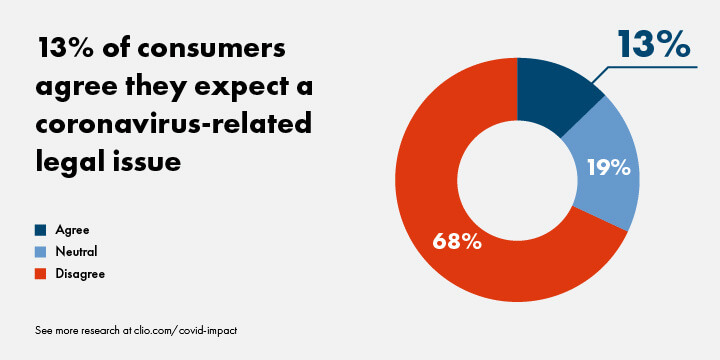
Law firms are taking the outbreak seriously, few anticipate layoffs
It is clear that legal professionals take the novel coronavirus outbreak seriously. Despite the disruptions due to COVID-19, only 11% of legal professionals agree that social restrictions are an overreaction to the virus. Additionally, 3 out of 4 legal professionals surveyed report higher levels of stress and anxiety, and nearly half of respondents say they are more concerned for their financial future than for their personal health.

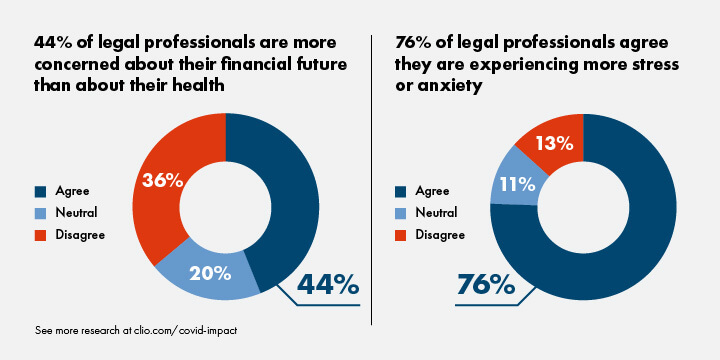
While the majority of firms surveyed have avoided shifting their broader business strategies related to staffing, customer acquisition, and areas of practice, 66% expect their day-to-day operations will be impacted long term, even beyond the pandemic. Technology will likely play a significant role in how firms adapt long term, as 69% see technology as more important now, and 83% say cloud technology in particular is necessary for their survival.
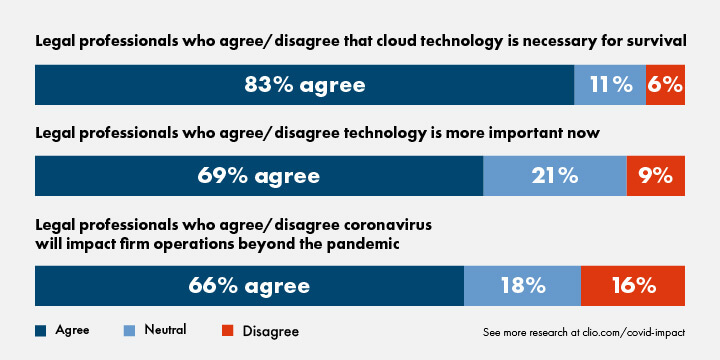
Lawyers are still essential but will need to adapt to client needs
Overall, public perception of lawyers remains significantly positive for lawyers among the general population, as 77% see lawyers as an essential service. However, many consumers also perceive barriers in terms of cost and the accessibility of legal services.
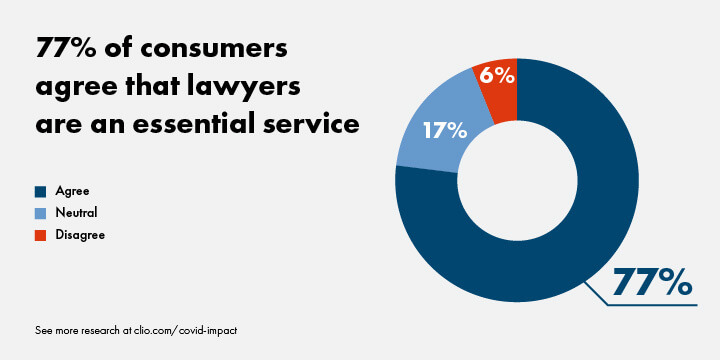
Similar to legal professionals, many consumers say they have used and are becoming more comfortable with new types of technology since the coronavirus situation began, and expressed the need for lawyers to offer remote solutions. The legal industry may have work to do in alleviating concerns around handling legal proceedings outside of physical court spaces, as many consumers also believe that a remote trial would negatively impact their case outcome.
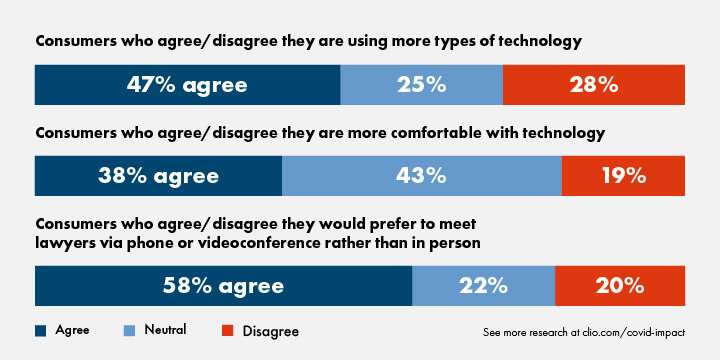
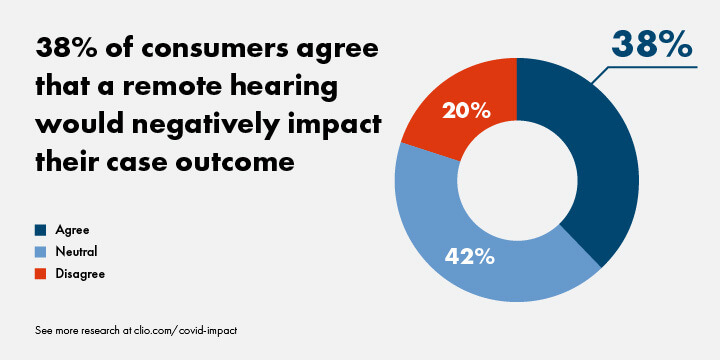
Detailed survey findings
The majority of legal professionals surveyed report experiencing significant disruption to their business since the start of the coronavirus outbreak. This is likely due to the fact that consumers say they are more likely to delay seeking legal help if they were to experience a problem.
- 77% of legal professionals surveyed say they have experienced many changes to the day-to-day operations of their law practice.
- 67% of legal professionals surveyed are much more worried about the success of their law practice, and 57% are worried about making a living over the next few months. In comparison, 46% of consumers are very worried about making a living over the next few months.
- 56% of legal professionals surveyed have seen a significant decrease in the number of people reaching out to their law practice for legal help, and 53% report being significantly less busy at work. 49% of consumers say that if they were to experience a legal issue in the next two months, they will very likely put it off until circumstances surrounding the coronavirus pandemic go back to normal.
- Not all law firms have been affected by client demand, however. 23% of those surveyed report not seeing a significant decrease in the number of people reaching out. 14% report a significant increase in the number of people reaching out for legal help.
The majority of legal professionals surveyed are taking the coronavirus outbreak very seriously, and anticipate longer-term disruption as a result of the situation in the US. Legal professionals are also less optimistic than the general population.
- Only 11% of legal professionals surveyed agree that the world is overreacting to the coronavirus.
- 59% of legal professionals surveyed don’t believe the US economy will bounce back in the next three months.
- 57% of legal professionals surveyed don’t believe that the social impact of the coronavirus epidemic in the US will significantly subside in the next three months. Conversely, only 29% of the general population don’t believe the social impact will subside in the next three months.
The impact of the coronavirus situation is causing both financial and health concerns for many of the legal professionals surveyed.
- 44% of legal professionals surveyed are more concerned about their financial future than they are about their health.
- 75% of legal professionals surveyed say they are experiencing more stress and/or anxiety (physical, mental, or emotional) than they were before the coronavirus outbreak, which is slightly higher than the average of 65% for the general population.
- Of the general population, only 24% believe economic issues are much more important than health-related issues surrounding the coronavirus pandemic.
Despite concerns, few legal practices have adjusted their higher level business strategies in response to current challenges.
- Only 22% of firms surveyed are doing more to get new clients than before the coronavirus outbreak (for example, through marketing, networking, or business development).
- Only 11% of firms surveyed have laid off any staff, and only 15% expect layoffs in the next 3 to 6 months.
- 24% of firms surveyed are strongly considering changing or broadening their area of legal specialization in the next few months.
While many law practices have not adapted their higher level business strategies, most agree that the coronavirus situation will have an impact on their daily operations for both the short and long term.
- 69% of legal professionals surveyed believe that technology will be much more valuable to their practice or firm in the near future than it was before the Coronavirus outbreak.
- 83% of legal professionals surveyed believe that cloud technology (saving files and documents to a secure remote server rather than a local hard drive) is necessary for the survival of their practice in the near future.
- 66% of legal professionals surveyed say the coronavirus outbreak will impact how their law firm or practice will operate after the pandemic comes to a close.
Public perception of lawyers remains significantly positive for lawyers among the general population.
- 77% of consumers agree that lawyers provide an essential service to our society.
- 20% of consumers say that lawyers are much more relevant now than they were before the coronavirus pandemic began.
Despite many consumers expressing that they would delay getting help for a legal issue, most still prefer to work with a lawyer in resolving their issue rather than seeking out other types of solutions. Several respondents also foresee having a legal issue in the near future, many of which for an issue specifically rated to coronavirus. However, while a substantial number of consumers say they’ll likely need legal help in the near future, many also perceive barriers in terms of cost and the accessibility of legal services.
- 60% of consumers say if they have a legal issue or need legal help in the next two months, they will seek help from a lawyer rather than handle it themselves or use some other resource. Only 11% disagree.
- 16% of consumers foresee having a legal issue in the near future, and 13% foresee needing legal help specifically for a coronavirus-related issue.
- 52% of consumers say that if they had to deal with a legal issue in the next few months, they would not be able to afford the associated legal costs and fees.
- 22% of consumers say they believe that most lawyers have stopped offering legal services because of the coronavirus pandemic.
- 22% of consumers say that lawyers are much less likely to deliver quality legal services to their clients now than they were before the coronavirus pandemic.
- 38% of consumers believe that if they had a legal issue go to trial, a remote hearing/trial (as opposed to an in-person one) would negatively impact the outcome of my case.
Much like lawyers, many consumers are growing more comfortable with technology, and they expect legal professionals to be able to offer a range of online services.
- 47% of consumers say that they’ve used many more different types of technology tools than they had before the coronavirus situation began.
- 38% of consumers say they’ve become much more comfortable with technology than they were before the coronavirus situation began.
- 69% of consumers say they would prefer working with a lawyer who could share documents electronically via web page, app, or online portal.
- 58% of consumers say that if they had to hire a lawyer in the next two months, they would definitely prefer to meet them by videoconference rather than in person (if meeting in person was possible).